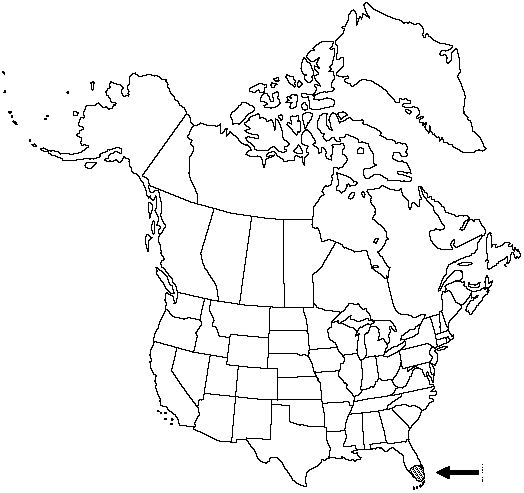Difference between revisions of "Lygodium microphyllum"
Prodr. 162. 1810.
FNA>Volume Importer |
imported>Volume Importer |
||
| (7 intermediate revisions by 2 users not shown) | |||
| Line 8: | Line 8: | ||
}} | }} | ||
|common_names=Small-leaved climbing fern | |common_names=Small-leaved climbing fern | ||
| − | |basionyms={{Treatment/ID/ | + | |special_status={{Treatment/ID/Special_status |
| + | |code=I | ||
| + | |label=Introduced | ||
| + | }} | ||
| + | |basionyms={{Treatment/ID/Basionym | ||
|name=Ugena microphylla | |name=Ugena microphylla | ||
|authority=Cavanilles | |authority=Cavanilles | ||
| + | |rank=species | ||
| + | |publication_title=Icon. | ||
| + | |publication_place=6: 76, plate 595. 1801 | ||
}} | }} | ||
|synonyms= | |synonyms= | ||
| Line 20: | Line 27: | ||
}}<!-- | }}<!-- | ||
| − | --><span class="statement" id="st- | + | --><span class="statement" id="st-undefined" data-properties=""><b>Stems </b>creeping. <b>Leaves</b> to ca. 10 m. <b>Petioles</b> borne 2-5 mm apart, 7-25 cm. <b>Sterile</b> pinnae on 0.5-1.5 cm stalks, oblong, 1-pinnate, 5-12 × 3-6 cm; ultimate segments triangular-lanceolate to oblong-lanceolate, truncate to shallowly cordate or somewhat auriculate proximally, usually not lobed, but if lobed, lobes rounded at apex and not directed toward leaf apex; segment apex rounded-acute to obtuse; segments articulate to petiolules, leaving wiry stalks when detached; blade tissue glabrous abaxially. <b>Fertile</b> pinnae on 0.5-1 cm stalks, oblong, 1-pinnate, 3-14 × 2.5-6 cm; ultimate segments ovate to lanceolate-oblong, fringed with fertile lobes, otherwise similar to sterile segments.</span><!-- |
-->{{Treatment/Body | -->{{Treatment/Body | ||
|habitat=Terrestrial on riverbanks, swamps (especially cypress swamps), cabbage palm hammocks, and other wet, disturbed sites. | |habitat=Terrestrial on riverbanks, swamps (especially cypress swamps), cabbage palm hammocks, and other wet, disturbed sites. | ||
|distribution=Fla.;Asia. | |distribution=Fla.;Asia. | ||
| − | |discussion=<p>Lygodium microphyllum is native to southeastern Asia and recently naturalized. The species may be very abundant locally and may climb to a height of 9 meters in trees. Sometimes it forms thick mats covering considerable areas at ground level (J. Beckner 1968; C. E. Nauman and D. F. Austin 1978).</p> | + | |introduced=true |
| + | |discussion=<p><i>Lygodium microphyllum</i> is native to southeastern Asia and recently naturalized. The species may be very abundant locally and may climb to a height of 9 meters in trees. Sometimes it forms thick mats covering considerable areas at ground level (J. Beckner 1968; C. E. Nauman and D. F. Austin 1978).</p> | ||
|tables= | |tables= | ||
|references= | |references= | ||
| Line 34: | Line 42: | ||
-->{{#Taxon: | -->{{#Taxon: | ||
name=Lygodium microphyllum | name=Lygodium microphyllum | ||
| − | |||
|authority=(Cavanilles) R. Brown | |authority=(Cavanilles) R. Brown | ||
|rank=species | |rank=species | ||
| Line 43: | Line 50: | ||
|habitat=Terrestrial on riverbanks, swamps (especially cypress swamps), cabbage palm hammocks, and other wet, disturbed sites. | |habitat=Terrestrial on riverbanks, swamps (especially cypress swamps), cabbage palm hammocks, and other wet, disturbed sites. | ||
|distribution=Fla.;Asia. | |distribution=Fla.;Asia. | ||
| + | |introduced=true | ||
|reference=None | |reference=None | ||
|publication title=Prodr. | |publication title=Prodr. | ||
|publication year=1810 | |publication year=1810 | ||
| − | |special status= | + | |special status=Introduced |
| − | |source xml=https:// | + | |source xml=https://bitbucket.org/aafc-mbb/fna-data-curation/src/2e0870ddd59836b60bcf96646a41e87ea5a5943a/coarse_grained_fna_xml/V2/V2_651.xml |
|genus=Lygodium | |genus=Lygodium | ||
|species=Lygodium microphyllum | |species=Lygodium microphyllum | ||
| − | |||
| − | |||
| − | |||
| − | |||
| − | |||
| − | |||
| − | |||
| − | |||
| − | |||
| − | |||
| − | |||
| − | |||
| − | |||
| − | |||
| − | |||
| − | |||
| − | |||
| − | |||
}}<!-- | }}<!-- | ||
-->[[Category:Treatment]][[Category:Lygodium]] | -->[[Category:Treatment]][[Category:Lygodium]] | ||
Latest revision as of 20:24, 5 November 2020
Stems creeping. Leaves to ca. 10 m. Petioles borne 2-5 mm apart, 7-25 cm. Sterile pinnae on 0.5-1.5 cm stalks, oblong, 1-pinnate, 5-12 × 3-6 cm; ultimate segments triangular-lanceolate to oblong-lanceolate, truncate to shallowly cordate or somewhat auriculate proximally, usually not lobed, but if lobed, lobes rounded at apex and not directed toward leaf apex; segment apex rounded-acute to obtuse; segments articulate to petiolules, leaving wiry stalks when detached; blade tissue glabrous abaxially. Fertile pinnae on 0.5-1 cm stalks, oblong, 1-pinnate, 3-14 × 2.5-6 cm; ultimate segments ovate to lanceolate-oblong, fringed with fertile lobes, otherwise similar to sterile segments.
Habitat: Terrestrial on riverbanks, swamps (especially cypress swamps), cabbage palm hammocks, and other wet, disturbed sites.
Distribution

Introduced; Fla., Asia.
Discussion
Lygodium microphyllum is native to southeastern Asia and recently naturalized. The species may be very abundant locally and may climb to a height of 9 meters in trees. Sometimes it forms thick mats covering considerable areas at ground level (J. Beckner 1968; C. E. Nauman and D. F. Austin 1978).
Selected References
None.